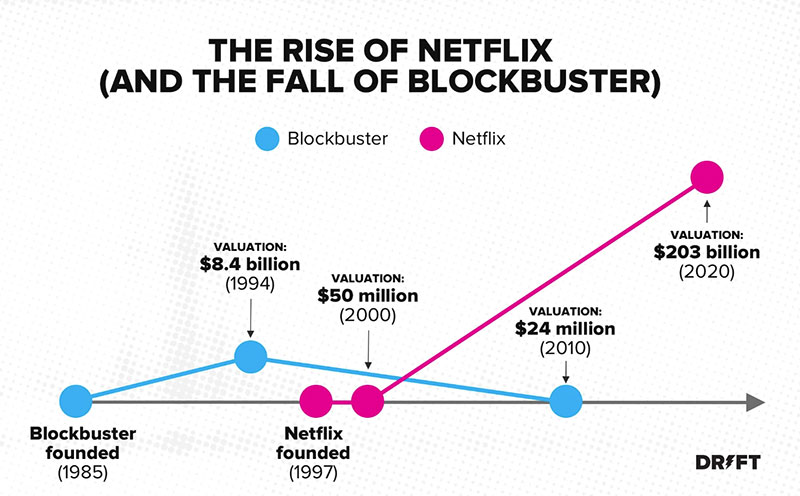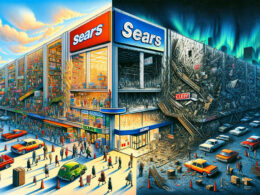The Last Rental: Why Did Blockbuster Fail?

Imagine the familiar blue and yellow sign, a beacon for movie lovers seeking their weekend entertainment. Yet, despite commanding the home movie rental space, Blockbuster’s collapse shook the retail world to its core.
Why?
This once-revered giant failed to adapt to the relentless digital transformation, missing the mark on key technological advancements.
In this deep-dive, you’ll unravel the pivotal missteps and critical business model flaws that led to Blockbuster’s fall.
You’ll learn about the underestimated streaming services rise and how consumer behavior shift towards companies like Netflix left Blockbuster in the dust.
Together, we’ll explore the market disruption that changed our media consumption forever and how a titan like Blockbuster succumbed to the innovative online entertainment tide.
By the end of this read, you’ll have unraveled the complex fabric of a seemingly simple question: why did Blockbuster fail?
The Catalysts of Change
The Netflix Proposition

So here’s the deal. There’s this little startup, Netflix, right? They’re like, “Hey, why not mail DVDs to folks?” And guess what, it totally clicks.
Now, here’s the kicker. Blockbuster could’ve snagged Netflix for just $50 million. But they were like, “Nah, we’re good.” Talk about a plot twist.
Blockbuster’s missed opportunity to acquire Netflix
This was like the golden ticket that slipped through their fingers. Imagine what could’ve been if Blockbuster had taken that chance.
A mashup of Blockbuster’s might and Netflix’s fresh ideas? Unstoppable. But alas, it was a shot not taken.
The shift to DVD mail rentals and streaming
People were digging this whole mail-my-DVD thing. No late fees, no due dates. And then, Netflix flips the script and dives into streaming.
It’s like everyone’s got a cinema in their pocket now. Pure magic.
Technological Advancements
We’ve got tech shooting off like fireworks now. It’s all about getting your movie fix without moving an inch.
And if you can’t keep up, you’re out. Simple as that.
The rise of digital streaming

Streaming’s the new kid on the block, and man, is it making waves. It’s like walking into an endless movie buffet, all you can watch, 24/7.
Consumer preference for on-demand services
So now, no one wants to wait around, right? If you’re not giving people what they want, when they want it, you’re basically history.
And that’s a tough pill to swallow for anyone left playing catch-up.
Strategic Missteps
Failure to Innovate

So here’s the scoop. Blockbuster was chilling at the top, comfy and cozy, thinking they’ve got this whole movie rental biz in the bag.
But then, bam!
The world’s changing around them, and they’re just standing there, not budging. They’ve got this golden chance to ride the online rental wave, but they totally snooze on it.
Ignoring the potential of online rentals
Online rentals are blowing up, but Blockbuster’s like, “Nah, we’re good with our stores.” Big oops there.
They’re missing out on the whole movie-at-a-click deal that everyone’s starting to dig.
Delay in launching a competing service
By the time they catch on, it’s like showing up to the party when everyone’s already leaving.
They try to get in on the streaming gig, but it’s a little too late. The crowd’s already gone.
Business Model Limitations
So, the way Blockbuster’s making their dough? It’s with those pesky late fees. But guess what? People are so not into that.
They’re craving something smoother, something without all those extra costs sneaking up on them.
Over-reliance on late fees
Late fees are like Blockbuster’s bread and butter. But when everyone else is offering a no-late-fee vibe, sticking to your old guns doesn’t seem so smart.
Inability to transition to a subscription-based model
Subscription’s the new buzzword, but Blockbuster’s still flipping through their old playbook.
They can’t seem to wrap their head around this whole pay-once-and-chill deal that everyone else is getting hyped about.
Internal Conflicts and Leadership Challenges
Management Disputes
Okay, so inside Blockbuster, it’s like a drama series. You’ve got big shots like Carl Icahn and other investors stepping in, and it’s not all sunshine and rainbows.
There are clashes, and not the cool kind.
The role of Carl Icahn and other investors
Carl Icahn steps in, and he’s shaking things up, but not everyone’s on board. It’s like a tug-of-war, and it’s pulling Blockbuster in all sorts of directions.
CEO turnover and strategic disagreements
It’s like a game of musical chairs with the CEOs. One’s out, another’s in, and with each switch, the game plan’s getting all muddled up.
Not the best look when you’re trying to keep a giant like Blockbuster on its feet.
Visionary Leadership
So, what’s the deal with the folks calling the shots? Well, they’re kinda stuck in the past.
It’s like they can’t see the tsunami of change heading right for them.
Lack of foresight in embracing new business models
New business models are popping up, and they’re hot. But the head honchos at Blockbuster?
They’re turning a blind eye, clinging to their old-school ways.
Resistance to change within corporate culture
It’s not just the top dogs; the whole Blockbuster vibe is like, “We’re good with how things are.” But newsflash: the world’s not waiting.
And that’s how you end up asking, “Why did Blockbuster fail?” It’s a mix of missed chances, old habits, and a clock that’s ticking way too fast for them to catch up.
Financial Downfall
The Debt Burden
So, get this. Blockbuster’s bank account is looking like a ghost town. They’re carrying this massive debt on their shoulders, like a backpack full of bricks.
And this whole mess starts when Viacom decides to cut Blockbuster loose.
The impact of Viacom’s spinoff and associated debt
When Viacom’s like, “We’re out,” Blockbuster’s left holding this giant bag of debt.
It’s like they’ve been thrown into the deep end without any floaties.
Struggles with profitability and cost management
And man, trying to make a buck while drowning in debt? It’s like trying to win a race with your shoelaces tied together.
Every move they make, the debt’s just dragging them down harder.
Competition from Retail and Rental Services
But wait, there’s more. Blockbuster’s not just fighting their own money battles; they’ve got a whole army of competitors knocking at their door.
Price wars with big-box retailers
These big-box stores are throwing movie prices to the ground, and people are loving it. It’s like a sale frenzy, and Blockbuster’s caught in the crossfire, trying to keep their prices from hitting rock bottom.
Emergence of Redbox and other kiosk-based rental options
Then, boom, Redbox pops up, looking all shiny with its rental kiosks. It’s quick, it’s easy, and it’s everywhere.
People are digging this new kid on the block, and Blockbuster’s left eating their dust.
The Final Years
The Bankruptcy Filing
So here we are, at the grand finale. Blockbuster’s gasping for air, and then, they hit the red button: bankruptcy.
It’s the curtain call nobody wanted, but everyone saw coming.
The culmination of strategic and financial failures
It’s like a domino effect. One bad move leads to another, and before you know it, the whole thing comes crashing down.
It’s a mixtape of all the wrong tunes.
The aftermath and sale to Dish Network
In the aftermath, Dish Network swoops in, scooping up the pieces. But it’s like trying to glue back a shattered vase — the glory days are long gone.
The Legacy of Blockbuster
And now, what’s left of the blue and yellow giant? Nostalgia, memories, and one lone store standing in Oregon, like the last dinosaur.
The last standing store in Oregon
This place is like a time capsule, a slice of the ’90s still kicking it in today’s world. It’s quirky, it’s cool, and it’s a selfie hotspot.
Blockbuster as a cautionary tale of market evolution
But more than that, Blockbuster’s story is like a neon sign flashing a warning: evolve or get left behind.
It’s a tale of what happens when you miss the boat, and that boat’s got Wi-Fi, streaming, and no late fees.
FAQ On Why Blockbuster Failed
How did Netflix contribute to Blockbuster’s failure?
Netflix, huh? They were like the David to Blockbuster’s Goliath, only, David won here. It’s the convenience of Netflix that really dug into Blockbuster’s market. Streaming technology made it too easy to never leave your couch, and Blockbuster, well, it just couldn’t keep up with the internet’s pace.
Why didn’t Blockbuster adapt to the changing market?
Okay, so, adaptability was the Achilles’ heel for our blue-and-yellow friend. While the world was speeding into the digital age, Blockbuster clung tight to those physical DVD rentals. They took too long to see that consumer preferences were all about online marketplace convenience, and by then, it was game over.
Was Blockbuster’s bankruptcy sudden?
Not exactly a bolt from the blue, if you ask me. Blockbuster’s bankruptcy was a slow burn, a persisting refusal to acknowledge the shift to streaming services. It was like watching a ship sink slowly—you knew it’d happen, but they kept bailing water with a tea cup.
Could Blockbuster have avoided failure?
Sure, they had a shot. Like anyone standing at a crossroads, choices define outcomes. Had they embraced the digital media evolution and pivoted to video on demand services earlier, it might’ve been a whole different story. But, hindsight is 20/20, isn’t it?
What role did late fees play in Blockbuster’s decline?
Ah, late fees, everybody’s pet peeve. Those pesky fees gnawed away at customer goodwill like nothing else. In an age where the competition was offering no late fees, Blockbuster’s strict policy felt outdated. It became one of those reasons for people to jump ship.
Was it just Netflix that affected Blockbuster’s business?
Let’s zoom out a bit. Sure, Netflix was the headline, but the entire video rental industry was transforming. Blockbuster was also up against Redbox, cable TV’s video on demand, and a growing online entertainment scene. So, Netflix was the big blow, but not the only hit.
Did Blockbuster try to go digital?
They did! Blockbuster Online was their hat thrown into the ring. Trouble was, they were late to the party. The service tried to coexist with physical stores, which split their focus. It’s tough to win an online battle if your feet are still stuck in retail mud.
How did consumer behavior influence Blockbuster’s failure?
We’re creatures of comfort, aren’t we? We started loving the immediate satisfaction from streaming content. The ritual of going out to rent movies started feeling like a chore. Blockbuster’s model just didn’t jive with the “I want it now” mood that was spreading.
Did Blockbuster have any other competitors besides Netflix?
Oh, plenty! From Redbox kiosks to on-demand content from cable providers, competitors were popping up like mushrooms. Let’s not forget Amazon Prime and other emerging streaming services. Blockbuster was being circled by vultures on all sides, and they just couldn’t find a way to fight them all off.
What was the final nail in the coffin for Blockbuster?
The final curtain call came with their inability to shed the old skin of retail. Toss in a heap of corporate mismanagement, some serious denial about the digital transformation happening right before their eyes, and the extensive costs of maintaining retail stores—and there you have it. The end.
Conclusion
So, we’ve spun the reel to the end of our Blockbuster story. We’ve seen how a colossus of the video rental industry went from king of the hill to a whisper in the wind. In the twilight of its days, Blockbuster stood on the precipice but couldn’t find its footing as the digital revolution steamrolled ahead.
The crux of why Blockbuster failed? A cocktail of hesitation, mismanagement, and a skosh of denial. When the whistle blew, they were still lacing up their cleats, unprepared for the game change that streaming services brought to the playing field.
We can now sign off, pocketing some priceless lessons. Adapt fast, read the play, and maybe don’t bet against the internet. As we close this chapter, remember that Blockbuster, in its zenith, taught us how to love movies; in its downfall, it’s gifted us a masterclass in business strategy—or lack thereof.
If you liked this article about why Blockbuster failed, you should check out this article about what happened to Yik Yak.
There are also similar articles discussing what happened to Zulily, what happened to Anki, Freshly shutting down, and what happened to Turntable.fm.
And let’s not forget about articles on what happened to Juicero, what happened to ChaCha, Argo AI shutting down, and what happened to Segway.
- Understanding JavaScript Loops: A Beginner’s Guide - May 16, 2024
- Trending CSS-in-JS Libraries for Developers - May 16, 2024
- Integrating External JavaScript for Enhanced Functionality - May 15, 2024








